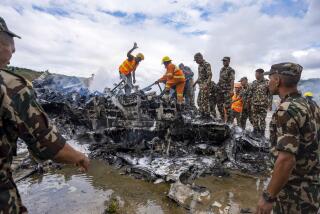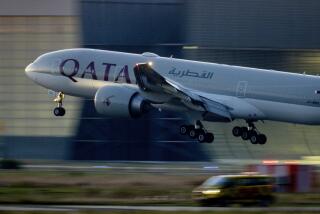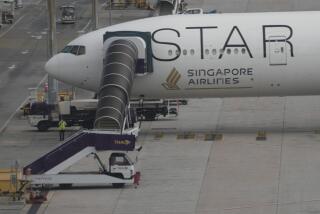329 Feared Dead in Mystery Jet Crash : Air India Plane Plunges Into Atlantic Without Warning; Bomb Suspected
LONDON — An Air India Boeing 747 jumbo jetliner flying at 31,000 feet went down without warning into the North Atlantic about 120 miles southwest of Ireland on Sunday, apparently killing all 329 passengers and crew on board.
Authorities suspected that a bomb caused what was called the third worst disaster in aviation history.
“Explosion is considered a distinct possibility in view of the fact that the wreckage is strewn over a wide area,” India’s minister of state for civil aviation, Ashok Gehlot, said in New Delhi. “Sabotage is a distinct possibility.”
Wreckage from the plane, bound from Montreal to London, was spread over a five-mile-square area in the open sea. Bodies were found near uninflated life rafts.
No survivors were found by nightfall Sunday, and authorities expressed doubt that anyone from the plane remained alive.
“We are surrounded by wreckage, and there are no signs of survivors,” said Cmdr. Jim Robinson, skipper of an Irish patrol vessel taking part in search operations.
145 Bodies Recovered
Officials with an international flotilla of ships and aircraft searching the crash site reported recovering 145 bodies before it was decided to scale down search operations until daybreak.
The bodies were shuttled by helicopter to the Irish port of Cork, where officials set up a temporary morgue.
An official at Cork Airport, who declined to be identified, said: “Every one of them (bodies) that I have seen is shattered or burned. I’ve never seen anything like it. Some of the lads are near tears.”
The crash occurred at about the time that a bomb exploded in a baggage container taken from another flight from Canada upon its arrival at Tokyo’s Narita International Airport. The blast killed two baggage handlers and injured four others.
The Canadian Pacific Airways plane, also a 747 and carrying 390 people, arrived in Tokyo on a flight from Vancouver about 15 minutes ahead of schedule. The baggage container exploded 40 minutes after it was taken from the plane.
Authorities were investigating a possible link between the Air India crash and the Tokyo explosion.
The Air India flight, which originated in Toronto, was two hours late in leaving Montreal because of what airline officials called air traffic problems. Officials at London’s Heathrow Airport said that if the plane had been on time, any bomb on board would have gone off at the airport.
A male with a foreign accent who identified himself as a member of the Sikh Student Federation claimed responsibility for the Air India crash in a telephone call to the New York Times. An employee of the newspaper said the caller claimed that his group placed a bomb aboard the plane to “protest Hindu imperialism.” Hindus are the majority in India, Sikhs a minority.
However, Canadian Press quoted a former leader of the Sikh Student Federation in Vancouver as saying the organization no longer exists. “It’s all baloney,” said Monmohan Singh. “Anyone can call and say something like that.”
Dr. Hardam Singh Azad, national chairman of the Sikh Assn. of America, told the Associated Press in Dallas that the call to the newspaper was made by “a crank.”
“U.S. Sikhs categorically condemn the alleged planting of bombs by any persons,” he said.
Sikh Violence
Authorities in London pointed out that within the Indian community in Canada, there is a sizable Sikh population.
In India, a Sikh campaign for greater autonomy in their home state of Punjab has spawned widespread violence between Sikhs and Hindus and Sikh groups and the Indian government. Sikh bodyguards stand accused of the assassination of Prime Minister Indira Gandhi last Oct. 31.
Air India manager Francis Degama said that the airline had received threats of terrorism in the past few months and had stepped up security precautions.
Top Indian Pilot
The pilot of the Air India plane, Hanse S. Narendra, 57, was described by the airline as one of its best pilots, with 26 years of experience.
Hugh O’Connor, spokesman for the regional traffic control center in Shannon, Ireland, said the pilot had checked in at 8:07 a.m., local time, and was given clearance to proceed to London. Six minutes later, O’Connor said, “He just vanished off the scope.
“Immediately, he was called and there was no reply,” O’Connor said. “There was no indication from the aircraft, no indication from his equipment, that anything was wrong. At this point in time, it is a complete mystery.”
Most jetliners are equipped with a button on the control columns that will broadcast a distress signal even if voice communication or all power is cut. So, the fact that there were no distress signals led aviation experts to suggest Sunday night that a sudden explosion might have wiped out any possibility of the pilots communicating a distress message or signal.
Clues to the disaster may come from the jet’s flight data recorder, commonly known as the “black box.”
The flight recorder is under several thousand feet of water, Joe Kerin, chief controller of Ireland’s Marine Rescue Coordination Center, said, but there should be no problem in recovering it because it is sending a continuous radio signal.
Bound for Delhi, Bombay
The Air India Flight 182 was to have gone on to New Delhi and Bombay after a stop for refueling at London’s Heathrow Airport.
In Montreal before the flight took off, police removed three pieces of luggage that had triggered metal detectors, airport officials said. The luggage was kept in Montreal and searched some time after the plane’s crash. An iron and a radio were found but no explosives or weapons.
“If in fact it was a bomb (which caused the plane to crash), it could have come from Toronto,” said Rubin Ginzburg, general manager of airports.
The Air India flight was the first commercial jet to crash on the transatlantic route, the International Air Transport Assn., in Geneva said.
Only two commercial air disasters are believed to have caused a greater loss of life: 582 were killed in the 1977 collision of two 747 jumbo jetliners on the runway at Tenerife airport in the Canary Islands; 346 died in 1974 when a Turkish Airlines DC-10 broke up in the air over northern France.
An Air India statement released in New York said there were 307 passengers and 22 crew members aboard the flight that crashed Sunday. Airline officials said 278 passengers were Canadians, many of them of Indian origin. The passengers included 77 children and two infants.
At least 19 U.S. residents, most of them going to India to visit relatives, were believed to have been aboard the flight. The 19 included 11 children and at least seven American citizens.
The U.S. citizens said by friends and relatives to be aboard were:
--Pulivelil K. Jacob, his wife Aleykutty, and their children Jessey, 13, Jhansy, 11, and Jestin, of suburban Detroit.
--Aleykutty Job, 42, and her daughter, Teena, 14, of Tonawanda, N.Y.
Other U.S. residents believed aboard were:
--Rajeshwar Gupta, his wife Swatantar, daughter Vandahnah, 15, and son Shaffi, 12, all from the Cincinnati area.
--Shashi Gupta, her daughter Arti, 9, and son Amit, 6, of Farmington Hills, Mich.
--Indira Swaminathan, 38, her son Anand, 15, and daughters Padma, 8, and Ramya, 5, of Sterling Heights, Mich.
--Prabha Reddy, 35, of North Tonawanda, N.Y.
Queen Elizabeth II sent a message of condolence to Indian Prime Minister Rajiv Gandhi. A former airline pilot, he immediately called a board of inquiry to investigate the crash.
More to Read
Sign up for Essential California
The most important California stories and recommendations in your inbox every morning.
You may occasionally receive promotional content from the Los Angeles Times.










